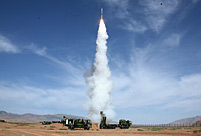The revelations regarding the US National Security Agency's (NSA) large-scale compromising of Internet privacy and security standards are not simply troubling from the point of individual rights, but also due to the potential damage done to the economic utility of the Internet itself. These revelations may spark an increased drive by foreign companies and governments alike to abandon the use of US software products.
Essentially, the NSA has developed a variety of ways to break commonly used forms of encryption in order to render e-mails and data files vulnerable to interception and examination.
However, the truly frightening and potentially damaging part of these revelations is that the NSA has worked in cooperation with an unknown number of tech companies to insert backdoors into their software in order to allow the NSA to easily monitor those using these products.
There are two equally damaging factors at work here. It is impossible to know if the software a company is using has been compromised by the NSA. And US software companies and Internet service providers may be cooperating, willingly or unwillingly, with the NSA. In such a case, they would be unlikely to admit to their role, due to the obvious potential for damage to their public reputation.
Additionally, although the NSA has long claimed that it only monitors foreign parties, the information that has been made available to the public by Edward Snowden has made it plain that the NSA does monitor US citizens and has even covertly provided information to the FBI, Drug Enforcement Agency and Internal Revenue Service in defiance of federal law.
Many Americans also have cause to regularly communicate with foreign business partners or clients, which would make their communications liable to "legal" NSA surveillance.
We also only have the NSA's assurances that it does not engage in economic espionage, which by now should carry little weight. Even foreign companies engaged in completely legitimate commerce must now face the risk that the US government may monitor their trade secrets and policies to the detriment of their business interests.
The second danger comes because the NSA was unable to prevent Snowden from making his revelations. Because of this, any company making use of US privacy or security software must face the risk that the vulnerabilities installed by the NSA could fall into the criminal hands. Both current and past communications could be deciphered by criminals and used to damage the companies' operations or to blackmail the owners by threatening to reveal proprietary information.
It is increasingly obvious that depending on US security software can be a very dangerous choice. In addition to the potential financial losses from a data breach, foreign companies may find themselves facing legal action from their clients, under the theory that they should have assumed that any security or encryption software created by a US company was compromised.
US Internet businesses, from data storage centers to antivirus and security software companies are thus likely to find their products and services increasingly unwanted in international markets.
In addition, foreign firms may doubt whether or not their US partners will be able to keep proprietary information secure. This is especially true given the NSA's habit of using warrants that forbid the recipient from disclosing the warrant's existence and target to other organizations or individuals.
The NSA has struck a deadly blow against the reputation of US software providers. Businesses that have spent their entire existence building up a reputation for ensuring the security of their clients' information have seen that reputation destroyed overnight. Worst of all, even uncompromised US software will exist under a cloud of suspicion, making it likely that foreign companies and individuals will seek out more secure alternatives.
Ultimately, while the NSA claims that its goals are merely to secure the safety of US citizens, its overreach in this area may have dealt a critical blow to one of the country's fastest growing and dynamic industries.
Recovering from this self-inflicted blow will require far more transparency and regulatory controls than the NSA appears willing to accept. It remains to be seen if Congress is willing to accept security at "any price," if that includes the long-term health of a major domestic industry.
The author is a freelance writer based in Corona, California. [email protected]
 Storms leave 97 dead, 58 missing in Mexico
Storms leave 97 dead, 58 missing in Mexico New model of indigenous surface-to-air missiles testfired
New model of indigenous surface-to-air missiles testfired  118.28-carat diamond to be auctioned in HK
118.28-carat diamond to be auctioned in HK Maternal love under streetlight
Maternal love under streetlight Naked foreign student sits in the middle of a road in Haikou
Naked foreign student sits in the middle of a road in Haikou  Colorful Yunnan: Enjoy the natural beauty
Colorful Yunnan: Enjoy the natural beauty Harbin named Chinese city with most beautiful women
Harbin named Chinese city with most beautiful women New college students' military training in Guangzhou
New college students' military training in Guangzhou Rugby girls
Rugby girls PLA's 38th Group Army conduct training
PLA's 38th Group Army conduct training Residences of the royal house of Savoy
Residences of the royal house of Savoy The last days of Wan Aihua
The last days of Wan Aihua Highlights at 12th National Games of China
Highlights at 12th National Games of China Beijing Film Academy welcomes freshmen
Beijing Film Academy welcomes freshmen Large mahjong party sets new world record
Large mahjong party sets new world recordDay|Week|Month